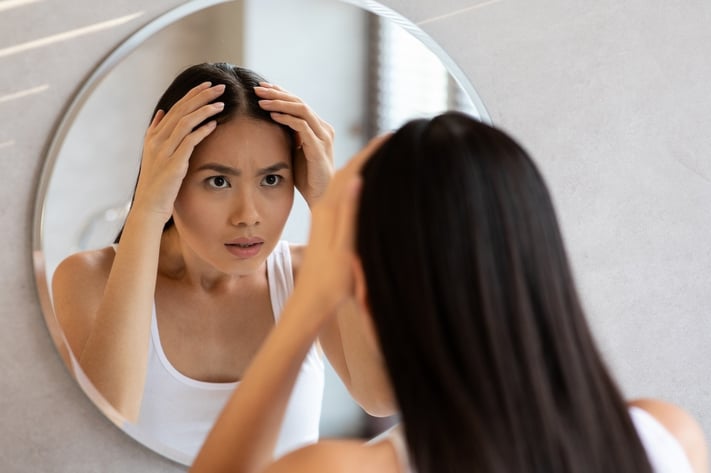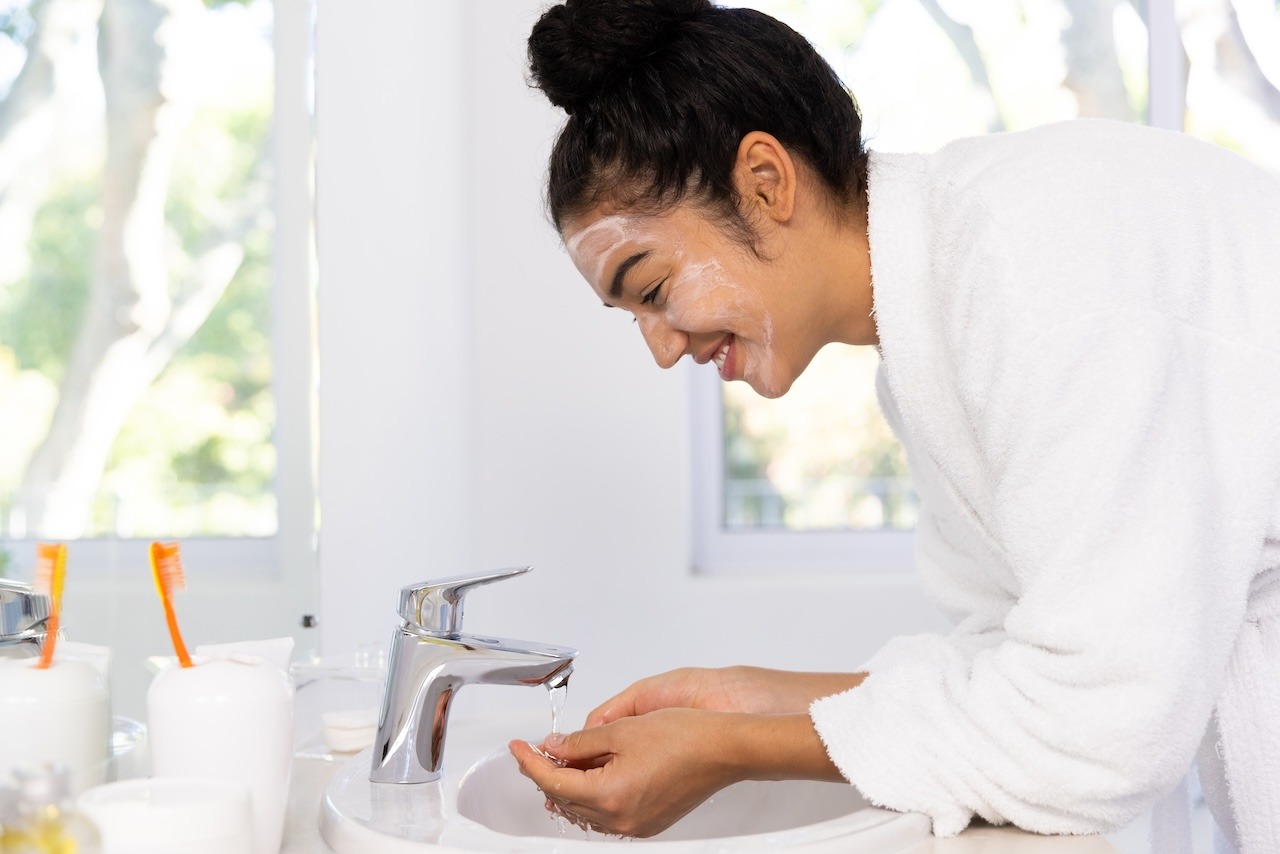Polycystic Ovarian Syndrome, or PCOS, is a diagnosis that typically causes unwanted skin issues—which is understandably emotionally distressing. It may seem scary to address these concerns, but fortunately, PCOS skincare can manage these symptoms for you!
In this article, you’ll uncover the best ways to maintain a beautiful and glowing complexion so you can feel confident about your appearance.
WHAT IS PCOS?
PCOS is a condition that encompasses a group of symptoms affecting women's hormone levels, fertility and ovaries. There’s no main symptom that leads to a PCOS diagnosis—each woman’s experience varies greatly, so a diagnosis is based on the combination of symptoms present. Here are the specific symptoms that lead to a PCOS diagnosis:
-
High Androgen Levels: The most common symptom of PCOS is a high production of androgen (male hormones). Since women's bodies require a delicate balance of male and female hormones, this overproduction can interfere with menstruation, ovulation and fertility. This hormone imbalance also causes the most visible symptoms: weight gain, excess body hair and skin conditions that require PCOS skincare treatment.
-
Polycystic Ovaries: Polycystic ovaries give PCOS its name and refer to an excess of follicles (immature eggs) on the ovaries. Since they’re fluid-filled sacs, they appear as cysts on imaging but are different from ovarian cysts. However, they can release more androgen into your system and contribute to infertility.
-
Insulin Resistance: Insulin-resistant PCOS is characterized by the body's lack of response to the insulin hormone. Instead of using insulin to convert blood sugar into energy, the cells leave insulin to circulate in the bloodstream. When the pancreas senses the body is not generating enough energy, it creates even more insulin—which the cells still reject. This buildup of insulin leads to high blood sugar and insulin levels, which causes inflammation, weight gain and increased risk of diabetes. The decreased energy production also leads to fatigue and exhaustion.
-
Inflammation: Inflammation is the body's natural response to injury or infection. However, women with PCOS often have chronic low-grade inflammation, which can trigger and worsen acne and rashes.
-
Irregular Menstruation: This includes missed periods, heavy or light flow, unpredictable cycles and no period. These changes in menstrual patterns are among the first signs of PCOS and should be addressed by a doctor.
Since PCOS can be so different for each woman, it’s estimated that 70% of cases are undiagnosed—and the ones that are show PCOS is extremely common, with 1 in 10 women of childbearing years being diagnosed. You are not alone! Many women face similar PCOS challenges, and there are many ways to handle the symptoms.
SKIN SYMPTOMS AND CONDITIONS ASSOCIATED WITH PCOS
The skin is often the first place PCOS symptoms appear. While each woman's experience may differ, many women with PCOS face similar skin issues. The most common include acne, hirsutism, alopecia and acanthosis nigricans.
ACNE

Increased androgen production can stimulate the sebaceous glands to overproduce oil. When this excess oil mixes with dead skin cells and bacteria, it can clog pores and lead to acne breakouts. These breakouts often occur on the lower half of the face, including the chin, jawline and neck area; however, any body area with oil glands can be affected.
PCOS-related acne can be stubborn and challenging to treat. Use a powerful exfoliator like our Serious Action Masque that clears the skin with effective skincare acids and calming botanicals.
HIRSUTISM
Hirsutism is a condition where women experience excessive hair growth that's similar to male-pattern hair. This hair growth comes from increased androgen production and can appear on the face (chin and upper lip), chest, back and abdomen.
ALOPECIA
Hair loss or thinning is a common symptom of PCOS. High androgen levels cause hair follicles on the scalp to shrink, so the hair on the head becomes thinner or has a wider part line.

ACANTHOSIS NIGRICANS (AN)
AN is a skin condition where dark, thick, velvety patches of skin appear in areas with folds or creases, such as the neck, armpits, groin and breasts. This condition is associated with insulin resistance; as insulin builds up in the bloodstream, it can stimulate the skin's pigment cells to produce more melanin, which appears as dark skin patches.
Working with your doctor to manage your blood sugar levels is essential for effective treatment of AN. However, you can reduce the appearance of AN with exfoliants like alpha-hydroxy acids, retinol and salicylic acid. Try our Purifying Cleanser with Salicylic Acid to shed dead skin cells and our Retinol Rejuvenation Serum to reduce pigmentation.
HOW TO MANAGE PCOS-RELATED SKIN ISSUES
PCOS is a lifelong condition, but with lifestyle and PCOS skincare routines, you'll feel confident and comfortable 24/7.
1. MEDICAL TREATMENTS
Your doctor may prescribe medications and supplements to help balance your hormones, reduce insulin resistance or manage specific symptoms like acne or excess hair growth. Remember that a combination of treatments and patience is essential for progress.
2. LIFESTYLE CHANGES

Adopting a healthy lifestyle is the most beneficial way to manage your PCOS skincare symptoms and improve overall health. Here are some great habits to start:
- Exercise regularly
- Maintain a healthy diet
- Manage stress levels
- Get adequate sleep
- Eliminate caffeine

3. PCOS SKINCARE ROUTINE
A consistent PCOS skincare routine is critical for managing skin issues. Here are a few helpful tips:
- Cleanse regularly with a gentle, pH-balanced cleanser. Use our Idyllic Cleanser with 3% Mandelic Acid for the added benefits of reduced pigmentation and exfoliation.
- Exfoliate 1 – 2 times a week to remove dead skin cells and unclog pores.
- Use a moisturizer to keep your skin hydrated and healthy.
- Protect your skin with our Oil-Free Protective Moisturizer with SPF 15 daily to prevent sun damage and hyperpigmentation.

4. SKINCARE TREATMENTS
Head to your favorite spa or clinic to book skincare treatments that manage your PCOS symptoms.
-
Dermaplaning: This exfoliating technique removes dead skin cells and excess hair for smooth, glowing skin. It's a great solution for removing facial hair and reducing the appearance of dark spots and acne scars.
-
Laser Hair Removal: This procedure uses light to remove hair at the follicle, making it perfect for eliminating excess hair growth caused by PCOS.
-
Chemical Peels: These treatments use skincare acids to shed dead cells and reveal brighter, smoother skin. They also help reduce acne scars and dark spots and improve overall texture and tone.
-
Electrolysis: This method uses a tiny needle and electrical current to destroy hair follicles, making it an effective and permanent solution for unwanted hair growth.
5. SUPPORT SYSTEM
PCOS can feel overwhelming but know that you are not alone. Seek support from friends and family or join online communities to connect with other women who understand what it's like to live with PCOS.
Managing your symptoms with PCOS skincare takes time and patience, but with the right help, you can achieve healthy, glowing skin. Remember to be gentle with yourself and make changes that feel good for you.
If you need or want professional help, don't hesitate to find a local GlyMed Pro. Our skincare experts are always ready to help you look and feel your best!
GlyMed Advanced Aesthetic Institute






